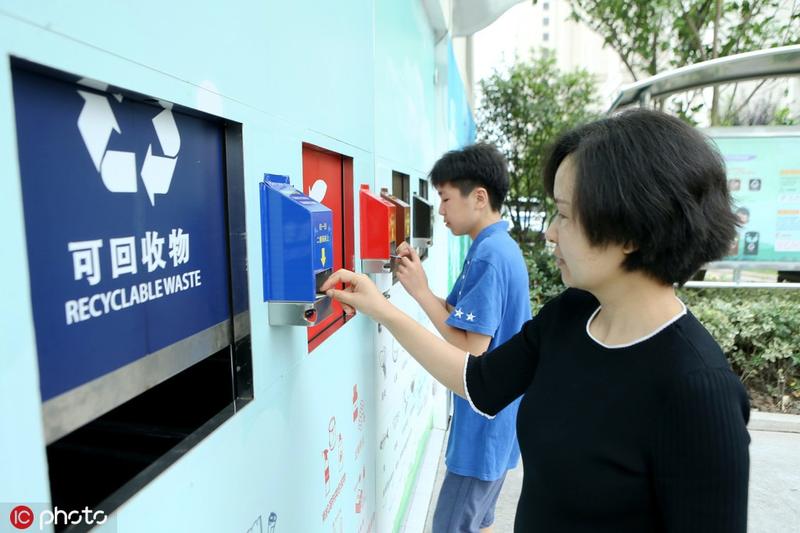 Local residents use QR code cards to open different bins for their garbage at a waste collection point in Shanghai, June 19, 2019. (PHOTO / IC)
Local residents use QR code cards to open different bins for their garbage at a waste collection point in Shanghai, June 19, 2019. (PHOTO / IC)
Domestic trash sorting has continued to be a hot topic at the ongoing annual meeting of the Shanghai Municipal People's Congress and the Chinese People's Political Consultative Conference Shanghai Committee, the city's legislative body and political advisory committee.
While delivering the report on the work of the government at the congress, Shanghai Mayor Ying Yong said that the city's trash sorting program, which was introduced in July, has been "a success", noting that 90 percent of the city's residential quarters had achieved the stipulated standards by the end of last year.
In the past, 41.4 percent of the trash in the city was buried in landfills, and with the support of residents' garbage classification actions, this ratio has been reduced to 20 percent
Ying Yong, Shanghai Mayor
Compared with 2018, the average amount of recyclables collected daily in 2019 increased by 431.8 percent. The amount of kitchen waste and hazardous waste collected also grew by 88.8 percent and 504.1 percent respectively.
The increase in collection of these types of waste, which can either be recycled or processed for further utilization, has resulted in a significant reduction in the city's residual waste, most of which goes to landfills.
"In the past, 41.4 percent of the trash in the city was buried in landfills, and with the support of residents' garbage classification actions, this ratio has been reduced to 20 percent," Ying said. "I give a sincere salute and a big thumbs up to you, the people of Shanghai."
Ying said that the government will strive to further improve the trash sorting and recycling system. Many of the city's legislators and members of the advisory body proposed ideas to aid this cause during the meeting.
The Jiusan Society, one of the democratic parties in the ongoing session of the municipal political consultative conference, suggested that the government set up funds to back scientific research regarding the utilization of kitchen waste. The society said that this could help to bridge the gap between the ever-growing quantity of kitchen waste and the limited treatment capacity for it.
ALSO READ: Beijing to levy fines on people who fail to properly sort waste
Wang Houfu, a political adviser of the city CPPCC, suggested that the opening of trash stations in residential neighborhoods-usually from 7 to 9 am and 6 to 8 pm-could be extended.
"The current schedule makes it difficult for long-distance commuters who have to leave early in the morning for work and only return late at night," Wang said. "The schedule was first introduced to help develop the habit of trash sorting, and since the majority of people are already compliant with the rule, the government should provide more flexibility for the convenience of the people."
Huang Shaoxing, a political adviser of the association of industry and commerce in Jing'an district, suggested a ban on the production and use of nondegradable plastic kitchenware and packaging used for takeout food.
Huang pointed out that takeout packaging for food accounts for up to 70 percent of the waste collected from office buildings as many white-collar workers tend to eat at work.
READ MORE: New robot can lend a hand in effort to sort waste
"This business creates too much trash that cannot be recycled and is a waste of resources," Huang said, adding that government should encourage use of biodegradable or recyclable materials for food delivery even though this could push the price of meals up.


